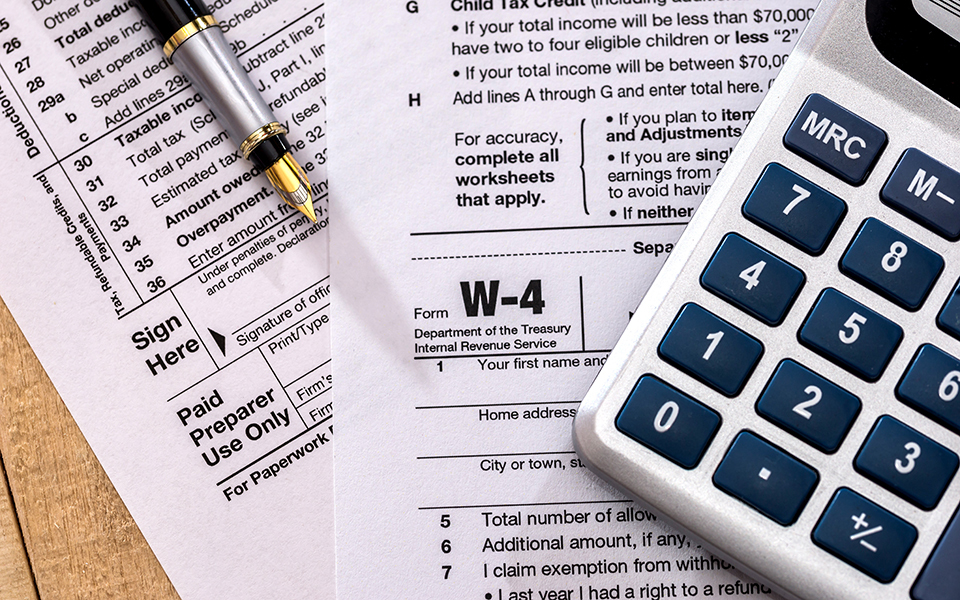After more than 30 years, the IRS has redesigned and updated Form W-4 to more accurately calculate employee tax withholdings in light of the changes enacted by the Tax Cuts and Jobs Act of 2017 (TCJA).
Form W-4 is completed by employees in order to indicate to the employer how much federal income tax to withhold from regular paychecks.
Prior to this recent revision, employees would indicate a number of allowances on Form W-4, which roughly represented the number of exemptions to be claimed on their Federal tax returns. The old form included worksheets to calculate additional allowances for those who would itemize deductions or had multiple earners or jobs in the same household. The more allowances claimed, the less would be withheld from each paycheck.
The TCJA has eliminated personal exemptions while increasing the standard deduction and tax credits for children and other dependents. The new form has been updated to remove the allowances calculation. Withholdings are now based on the number of children or dependent tax credits to be claimed.
The new W-4 is organized into five separate steps, only two of which apply to those with a single job and no dependents. In this case, tax withholding is calculated based on the standard deduction, with no other adjustments.
The additional steps are available to employees who may have multiple jobs or other income not subject to withholdings, such as investment or self-employment income, to more accurately withhold taxes. Spouses who plan to file a joint income tax return will need to coordinate filling out their respective new W-4s. Only one of them should complete the additional steps to account for a second job or other income, credits or deductions they anticipate reporting. This will help ensure a more accurate calculation of total tax withholding for both spouses.
While the new form is relatively straightforward, the IRS has set up an online withholding calculator to aid employees in completing the form (www.irs.gov/W4App). The W-4 may be updated anytime during the year as a taxpayer’s situation may change.
Employers should note that any new employee hired after January 1, 2020, will need to use the updated form. Others also required to use the updated form include current employees who previously indicated they were exempt from withholding for 2019, as well as any employee wishing to make changes to their withholdings.
CBIZ Recommendation
All current employees should consider completing a new W4 to avoid large over- or underpayments under the new tax code. For questions related to how the new W4 withholding form may affect you, your business or your employees, contact your CBIZ tax advisor.
© Copyright CBIZ, Inc. All rights reserved. Use of the material contained herein without the express written consent of the firms is prohibited by law. This publication is distributed with the understanding that CBIZ is not rendering legal, accounting or other professional advice. The reader is advised to contact a tax professional prior to taking any action based upon this information. CBIZ assumes no liability whatsoever in connection with the use of this information and assumes no obligation to inform the reader of any changes in tax laws or other factors that could affect the information contained herein. Material contained in this publication is informational and promotional in nature and not intended to be specific financial, tax or consulting advice. Readers are advised to seek professional consultation regarding circumstances affecting their organization.
“CBIZ” is the brand name under which CBIZ CPAs P.C. and CBIZ, Inc. and its subsidiaries, including CBIZ Advisors, LLC, provide professional services. CBIZ CPAs P.C. and CBIZ, Inc. (and its subsidiaries) practice as an alternative practice structure in accordance with the AICPA Code of Professional Conduct and applicable law, regulations, and professional standards. CBIZ CPAs P.C. is a licensed independent CPA firm that provides attest services to its clients. CBIZ, Inc. and its subsidiary entities provide tax, advisory, and consulting services to their clients. CBIZ, Inc. and its subsidiary entities are not licensed CPA firms and, therefore, cannot provide attest services.
